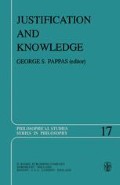Abstract
Much of what a person knows at any time is based on evidence the person has, or perhaps has had. More generally, most of a person’s knowledge at any time is based on reasons that the person has or has had. But what is it for knowledge to be based on evidence or reasons? A complete answer to this question requires a full theory of inferential knowledge, something I will not try to provide here. Instead, I will examine three notions of basing, each of which, under some interpretation, seems necessary for knowing on the basis of evidence or reasons.
Access this chapter
Tax calculation will be finalised at checkout
Purchases are for personal use only
Preview
Unable to display preview. Download preview PDF.
References
M. Swain, ‘Epistemic Defeasibility,’ American Philosophical Quarterly, 11, (1974)
G. Pappas & M. Swain, eds., Essays on Knowledge and Justification, ( Ithaca: Cornell University Press, 1978 )
K. Lehrer, ‘Knowledge, Truth and Evidence,’ in M. Roth & L. Galis, eds., Knowing, ( New York: Random House ), 1970, p. 56
Swain, ‘Reasons, Causes and Knowledge,’ op. cit., pp. 229–230. Compare G. Harman, Thought, (Princeton: Princeton University Press ), 1973, Chapter 2
Lehrer, ‘Knowledge, Truth and Evidence’ in Roth & Galis, op. cit., p. 56. Compare Lehrer, Knowledge, ( London: Oxford University Press ) 1974, pp. 156–157
Elsewhere, Lehrer notes this point; see Knowledge, pp. 156–157
J. Swanson & L. Foster, eds., Experience and Theory, (Amherst: University of Massachusetts Press), 1970
See J. Pollock, ‘The Structure of Epistemic Justification,’ American Philosophical Quarterly, Monograph Series, # 4, (1970), pp. 64–66. Compare Pollock’s account of implicit reasons in Knowledge and Justification, ( Princeton: Princeton University Press ), 1974
Editor information
Editors and Affiliations
Rights and permissions
Copyright information
© 1979 D. Riedel Publishing Company
About this chapter
Cite this chapter
Pappas, G.S. (1979). Basing Relations. In: Pappas, G.S. (eds) Justification and Knowledge. Philosophical Studies Series in Philosophy, vol 17. Springer, Dordrecht. https://doi.org/10.1007/978-94-009-9493-5_3
Download citation
DOI: https://doi.org/10.1007/978-94-009-9493-5_3
Publisher Name: Springer, Dordrecht
Print ISBN: 978-90-277-1024-6
Online ISBN: 978-94-009-9493-5
eBook Packages: Springer Book Archive

